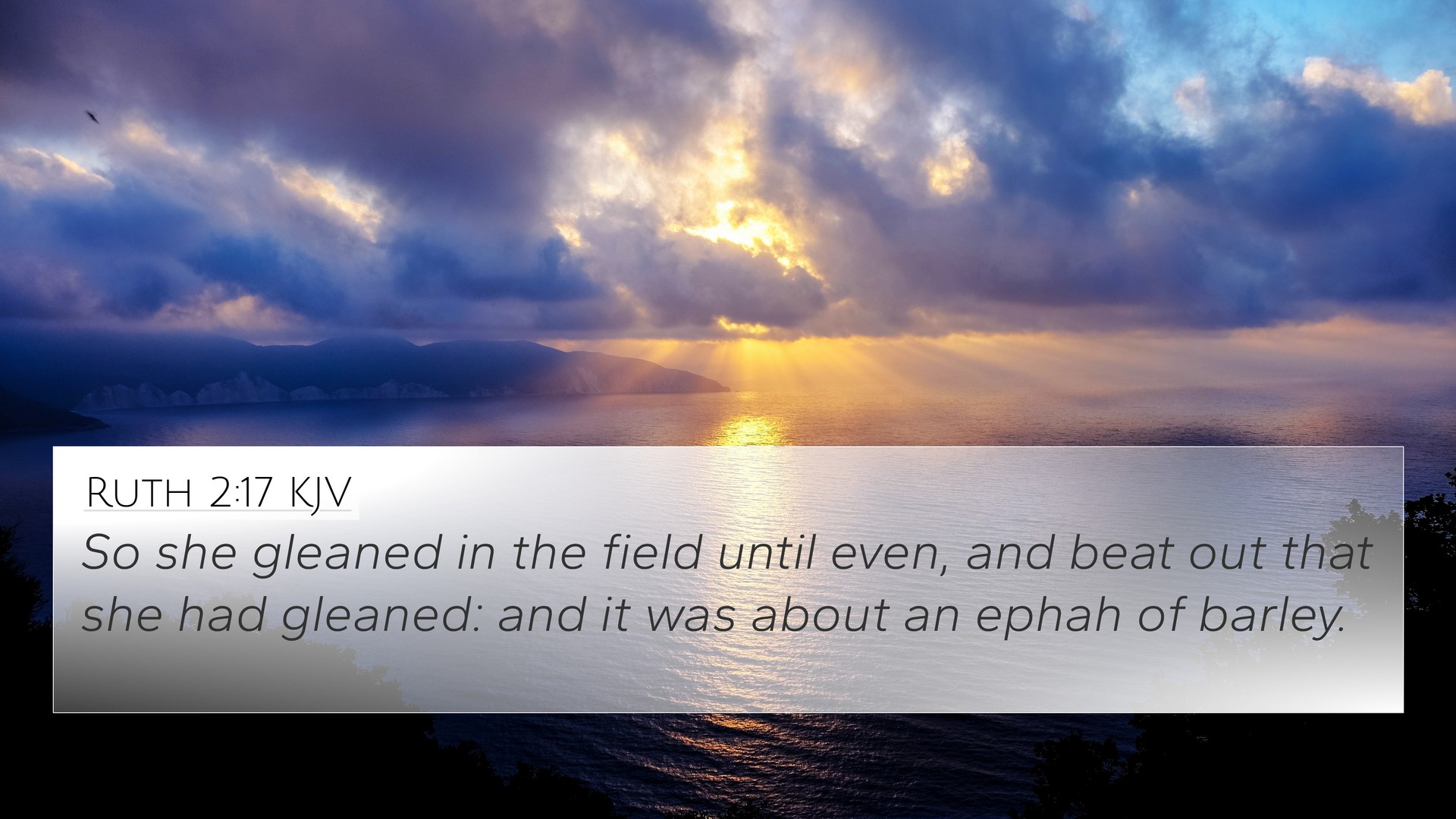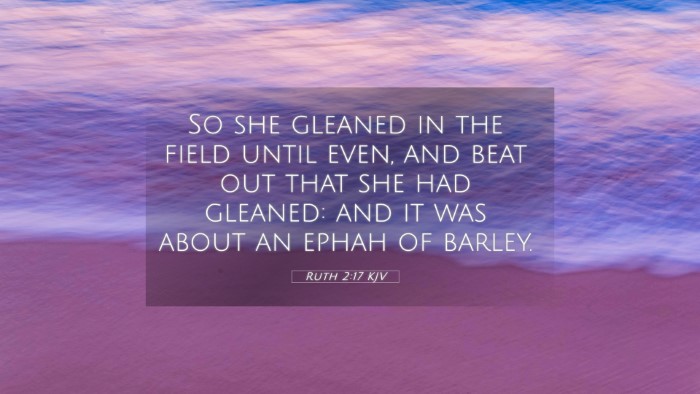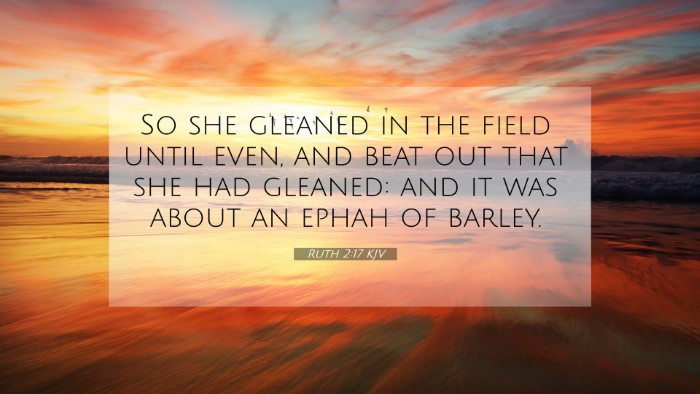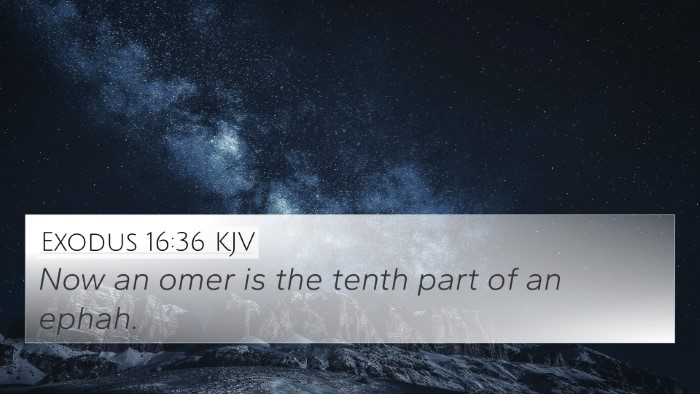Old Testament
Genesis Exodus Leviticus Numbers Deuteronomy Joshua Judges Ruth 1 Samuel 2 Samuel 1 Kings 2 Kings 1 Chronicles 2 Chronicles Ezra Nehemiah Esther Job Psalms Proverbs Ecclesiastes Song of Solomon Isaiah Jeremiah Lamentations Ezekiel Daniel Hosea Joel Amos Obadiah Jonah Micah Nahum Habakkuk Zephaniah Haggai Zechariah MalachiRuth 2:17 Similar Verses
Ruth 2:17 Cross References
So she gleaned in the field until even, and beat out that she had gleaned: and it was about an ephah of barley.
Uncover the Rich Themes and Topics of This Bible Verse
Listed below are the Bible themes associated with Ruth 2:17. We invite you to explore each theme to gain deeper insights into the Scriptures.
Ruth 2:17 Cross Reference Verses
This section features a detailed cross-reference designed to enrich your understanding of the Scriptures. Below, you will find carefully selected verses that echo the themes and teachings related to Ruth 2:17 KJV. Click on any image to explore detailed analyses of related Bible verses and uncover deeper theological insights.
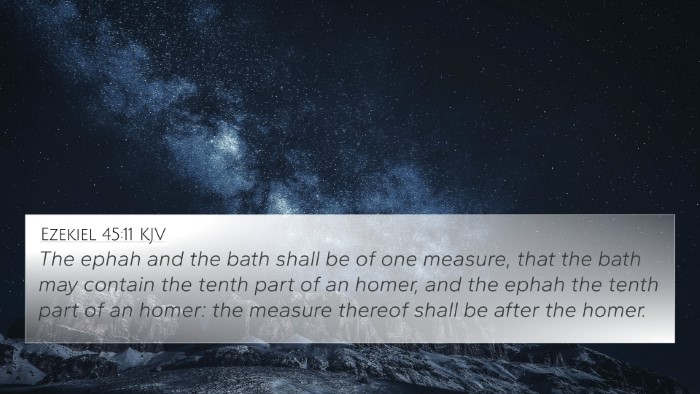
Ezekiel 45:11 (KJV) »
The ephah and the bath shall be of one measure, that the bath may contain the tenth part of an homer, and the ephah the tenth part of an homer: the measure thereof shall be after the homer.
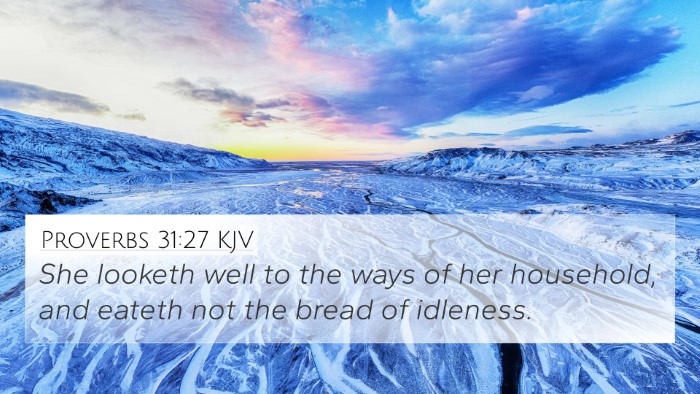
Proverbs 31:27 (KJV) »
She looketh well to the ways of her household, and eateth not the bread of idleness.
Ruth 2:17 Verse Analysis and Similar Verses
Understanding Ruth 2:17
Ruth 2:17 states, "So she gleaned in the field until evening, and beat out what she had gleaned; and it was about an ephah of barley." This brief verse encapsulates significant themes of hard work, providence, and the humble determination displayed by Ruth during her time in Bethlehem, illustrating deeper biblical principles and linking with various passages throughout the Scriptures.
Contextual Analysis
To understand Ruth 2:17 appropriately, we must consider its context within the Book of Ruth. This book tells the story of Ruth, a Moabite widow who, after the death of her husband, decides to remain with her Israelite mother-in-law, Naomi. Following Naomi's guidance, Ruth gleaned in the fields of Boaz, a relative of Naomi, which was an act of both survival and loyalty.
Thematic Elements
- Hard Work and Dedication: Ruth’s effort in gathering barley illustrates the virtue of diligence, a value praised throughout the Bible (Proverbs 10:4).
- Divine Providence: Her gleaning represents how God provides for His people, highlighting the importance of faith in His sustenance (Philippians 4:19).
- Social Justice: Gleaming laws in Leviticus 19:9-10 show God’s care for the poor and marginalized, aligning with Ruth's situation as a widow.
Bible Verse Cross-References
Ruth 2:17 connects with several other scriptures that enhance its interpretation and understanding:
- Leviticus 19:9-10: Outlines the laws regarding gleaning and caring for the poor.
- Proverbs 31:27: Highlights the industrious nature of a virtuous woman.
- 1 Timothy 5:8: Refers to the importance of providing for one’s family, reflecting Ruth’s sacrificial commitment.
- Psalms 146:7: Describes God’s love for the defenseless, resonating with Ruth’s position.
- Matthew 5:16: Encourages good deeds to shine light, akin to Ruth’s diligent work for Naomi.
- Philippians 4:19: God’s promise to provide our needs echoes the providence seen in Ruth’s life.
- James 1:27: States that pure religion cares for orphans and widows, emphasizing Ruth’s plight.
Insights from Public Domain Commentaries
Various biblical commentators offer rich insights into the layers of meaning found in Ruth 2:17:
- Matthew Henry: He emphasizes Ruth's industrious nature, noting that her gleaning not only provided sustenance but also demonstrated her character and faith. Henry reflects on the blessings of God that follow hard work, thus connecting Ruth’s actions to larger divine principles.
- Albert Barnes: Barnes points out the social implications of Ruth’s actions, noting that her gleaning reflects the law's purpose to provide for those in need. He sees in Ruth a picture of humility and grace, shedding light on the character of God as a provider.
- Adam Clarke: Clarke elaborates on the significance of the ephah of barley, interpreting it as a symbol of God’s generous provision. He underscores that Ruth’s gleaning was not just a struggle but a foretaste of blessings that would come through her faithfulness.
Applications and Reflections
The verse serves as an encouragement to believers to engage in diligent work in their daily lives, trusting in God’s providence and care. It marries the concepts of effort and faith, reminding us that while we should be industrious, we ultimately rely on God's provision.
Additionally, this verse provides a framework for understanding how seemingly small acts of faith and labor can lead to incredible blessings, both personally and spiritually. As Ruth’s story unfolds, her faithfulness leads to her becoming an ancestor of David, and ultimately, Jesus Christ. This connection emphasizes God’s overarching plan and purpose in ordinary lives.
Final Thoughts
In summary, Ruth 2:17 is a powerful verse that encapsulates themes of hard work, divine provision, and hope. By cross-referencing with other biblical texts, we can forge a deeper understanding of the interconnectedness of Scripture, fostering a richer appreciation of the story and its implications for our lives today. Through tools for Bible cross-referencing, believers can continue to unveil the thematic connections that bind God’s Word together.
